It's obvious when you think about it, that for online grocery shoppers selecting products to put in their basket, product Rating out of 5 is always more important than the number of Reviews, right?
Well, wrong actually and not just wrong occasionally, wrong most of the time. From our research of 3,710 online supermarket shoppers we know that when the average Ratings for two similar products are different by as much as 0.3 eg 4.2 vs 4.5, then the number of Reviews is much more important in product choice. Let me give you an example:
If you have 2 very similar products selling online and product A has an average Rating of 4.2 from 30 Reviews and Product B has an average Rating of 4.5 from 10 Reviews, then you'd think they'd be pretty close in terms of share of choice? Our research says that in reality, Product A, (the one with the lower Rating) is chosen twice as often as Product B. That's right, even though Product B has an obvious Rating advantage, shoppers still choose Product A 67.9% of the time.
Increasing the number of Reviews you have, almost regardless of the average Ratings will significantly improve your sales in online supermarkets. See our Kellogg case study to see an example of how much more your sales can go up with reviews.
How we did the research?
We surveyed members of our regular promotional cashback program Smart Activation about all manner of things related to their attitude and experience of online shopping including how they view and use supermarket product reviews. In a previous Blog post we looked at which categories shoppers read online product reviews on (the answer by the way is all of them). This time I want to tell you more about the relative importance of Ratings & Reviews.
We looked at the question of the Rating score out of 5 vs the number of Reviews in two ways:
- Shoppers ranked in order of importance parts of a mocked up supermarket product review summary
- Shoppers chose between paired alternative combinations of product Ratings & Reviews for "similar" products.
1. Parts of an online product review summary ranked in order of importance
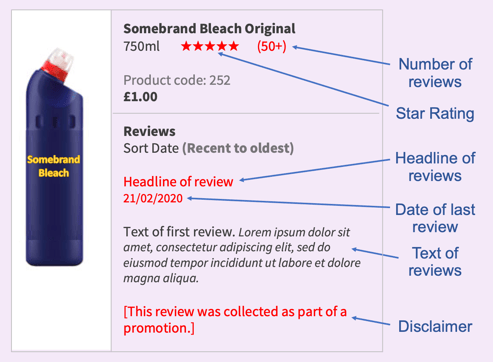
We presented supermarket online shoppers with the mocked up product review summary above and asked them to rank in order of importance the 6 elements shown above. From over 3,700 responses the average ranking was:
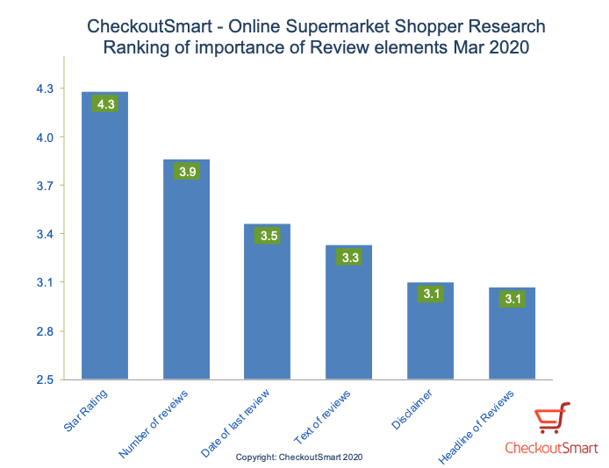
Clearly the average "Star Rating" is the most important element with the number of Reviews second. The Date of last review or "Recency" is next and then the "Text of last review" after this the Disclaimer and Headline are a distant 5th and 6th.
This seems to contradict our comment above that the number of Reviews is more important than the average Rating. We believe this is because this question is too far from the real experience of the virtual supermarket shelf. When asked in isolation the respondent's rational brain says "Star Rating" as this is for this one product. In reality, shoppers are much more likely to be using Ratings & Reviews to help choose between two similar products. This was the scenario we researched next.
2. Choosing between two similar products
For this we presented online grocery shoppers with 6 random alternative scenarios from a total of 24, where the Star Rating and the number of Reviews were relatively close but in the opposite direction ie one product had a higher Star Rating but lower number of Reviews and vice versa.
The "blank" below was filled with their favourite online retailer a question from earlier in the survey.
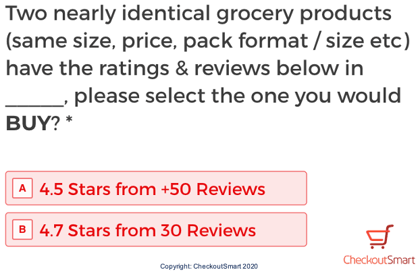 The 22,260 responses to these questions were then analysed to understand the relative share of choice or market share if you prefer, for each product A or B. The alternatives test included 6 Ave Start Ratings and 4 Reviews = 24 options.
The 22,260 responses to these questions were then analysed to understand the relative share of choice or market share if you prefer, for each product A or B. The alternatives test included 6 Ave Start Ratings and 4 Reviews = 24 options.
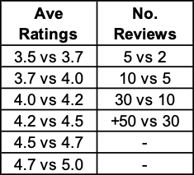
eg Product A Ave Star Rating 3.5 from 5 Reviews vs Product B Ave Rating Star 3.7 from 2 Reviews.
The results showed a clear preference for choosing the sku with more reviews:
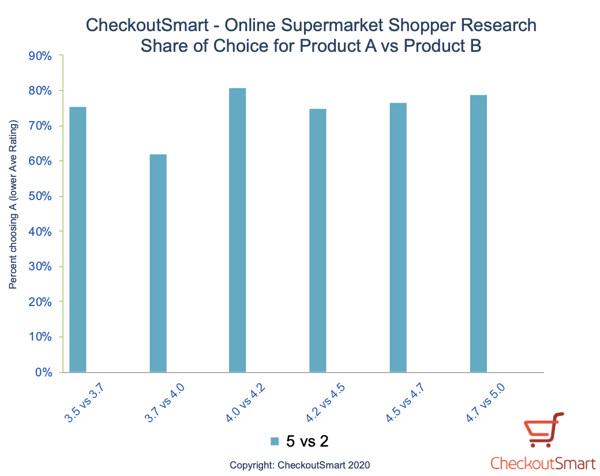
In 5 out of 6 pairings more than 75% of online grocery shoppers would choose the products with a lower average Star Rating but more reviews. The only exception was for 3.7 vs 4.0 where it was still 62%.
The average Star Rating comparison of 3.7 vs 4.0 proved to be an outlier across all of the No. of Ratings alternatives. We believe it is because it is comparing across the 3 vs 4 boundary as we can see here:
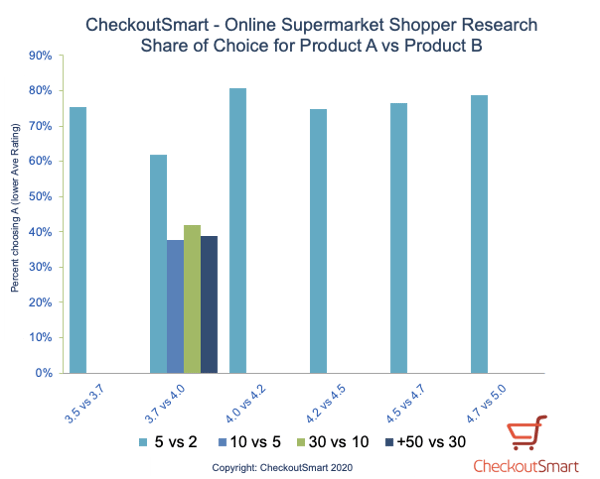
So when number of reviews comparison is greater than 5 vs 2 it looks like the psychological barrier between average Ratings of 3.. and 4.. is more important to online grocery shoppers when deciding between two similar products than a small number of reviews. However as you can see from the full chart of results below this is an outlier:
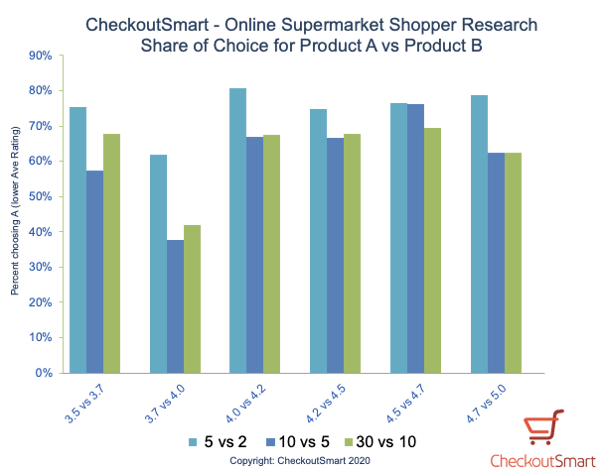
In all other cases there is a strong preference for the product with the lower average Star Rating with an average of 2/3 choosing this combination vs only one third for the one with the higher average Star Rating.
This preference for the lower Ave Star Rating begins to fade above 30 reviews, as you can see when we add in the 30 vs +50 Reviews alternative.
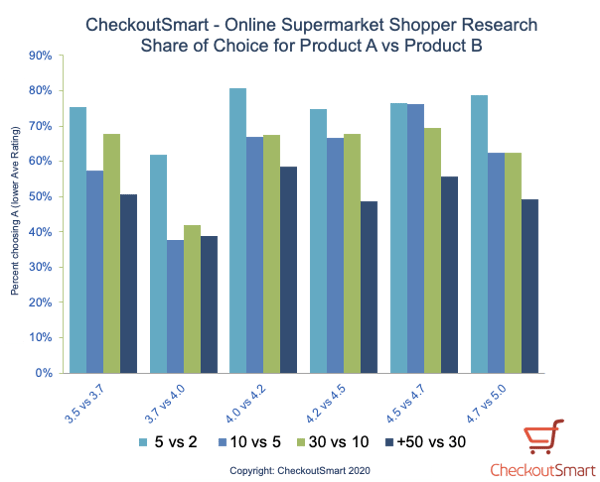
For these number of Reviews alternatives the average Product choice is exactly 50% across all of the ave Start Ratings so the number of reviews is still having an impact. This correlates with other research we have seen saying that the impact of increasing number of reviews begins to tail off above 30. Of course it does have an impact beyond there but it is significantly more important to get your online product reviews up to 30 than to drive them beyond that.
The main reason for adding reviews beyond 30 becomes not because you want more Reviews per se, but because of Review Freshness we saw earlier. Once you have more than 30 online supermarket product reviews on all your products in all the retailers, it is now important to keep those reviews Fresh.
Recommendations
- It is critically important in product choice for online supermarket products to get the number of reviews to at least 30 for every sku
- If you have less than 30 Reviews and a similar competitor product has 30 or more with a even a lower Ave Star Rating. then they will be chosen at least 2/3 of the time.
- Once you have at least 30 online product Reviews it is important to keep these Fresh (< 6 months old) to maintain your preference over time.

For more on the topic of Shopper Marketing and how ratings & reviews fits in, see our page on its development here.


 fans 15,785
fans 15,785
 followers 4,312
followers 4,312